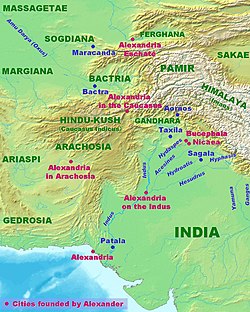Taxiles
Taxiles ( ancient Greek Ταξίλης ; † after 320 BC) was an Indian king and follower of Alexander the great in the 4th century BC. Its actual name was Omphis ( Sanskrit Ambhi ) or Mophis . However, he later took the name of his father, after whom the capital of his empire Taxila , in today's Pakistani Punjab , was named.
The kingdom of Omphis' father was on the upper reaches of the Indus , which he bordered in the west and the Hydaspes in the east . He had two neighbors as enemies. In the north it was Abisares and in the east Poros who ruled the land between Hydaspes and Akesines . The three kings were since the year 327 BC. Informed about the approach of the army of Alexander, against which Abisares and Poros allied. Omphis urged his father to submit to Alexander, but the father died before he had the opportunity. Omphis now made contact with the generals Hephaistion and Perdiccas himself , but refused them the act of submission, which he only wanted to commit personally in front of Alexander. After this in the spring of 326 BC When he had crossed the Indus in the 3rd century BC, a misunderstanding with serious consequences almost arose because Omphis went to receive him with his entire army. Ultimately, however, Omphis was able to prove his submissiveness to Alexander with rich gifts and in return received his kingdom confirmed by the conqueror. On the occasion of this event, Omphis now also took the name of his father, Taxiles. However, he also had to accept subordination to the satrap Philippos and tolerate a Macedonian garrison in his capital. During the festivities that were held in Taxila, Alexander made the acquaintance of the ascetics Saddhus, Yoghins and Kalanos , the latter of whom also joined the retinue of the Macedonians.
Taxile's calculation seemed to work when Alexander also demanded submission from Abisares and Porus. Only the former followed suit, but Poros prepared for war. Taxiles joined Alexander's army and took part in the victorious battle of the Hydaspes , but contrary to his expectations, the defeated Porus was pardoned by Alexander. This was not only left in his kingdom, he also had to pay no tribute and no occupation troops. Poros' position remained practically independent, while Taxiles had come completely under the rule of Alexander.
After the year 326 BC When the satrap Philippos had been murdered, the general Eudemos was installed in the northern Indus region. Taxiles and Poros received as a result of the imperial order of Babylon after Alexander's death in 323 BC. Their kingdoms back. At the conference of Triparadeisos 320 BC This order was confirmed by the victors of the first Diadoch war. Taxiles is then no longer mentioned in the sources. Otto Stein assumed, however, that statements about Poros and Taxiles were mixed up in the sources; therefore 317 BC Not Poros, but Taxiles was murdered by Eudemos.
literature
- Waldemar Heckel : Who's Who in the Age of Alexander the Great. Prosopography of Alexander's Empire. Blackwell, Oxford et al. a. 2006, ISBN 1-4051-1210-7 , pp. 260 f.
- Otto Stein : Taxiles . In: Paulys Realencyclopadie der classischen Antiquity Science (RE). Volume VA, 1, Stuttgart 1934, Col. 78-85.
Remarks
- ↑ Curtius Rufus 8,12,5.
- ↑ So Diodorus 17.86.4.
- ↑ Diodorus 18,3,2; Dexippos , story after Alexander , fragment 8 (in the Felix Jacobys edition ) or fragment 1 (in the Gunther Martins edition).
- ↑ Otto Stein: Taxiles. In: Paulys Realencyclopadie der classischen Antiquity Science (RE). Volume VA, 1, Stuttgart 1934, column 80 f.
| personal data | |
|---|---|
| SURNAME | Taxiles |
| ALTERNATIVE NAMES | Omphis; Ambhi |
| BRIEF DESCRIPTION | Indian king on the Indus |
| DATE OF BIRTH | 4th century BC Chr. |
| DATE OF DEATH | after 320 BC Chr. |
